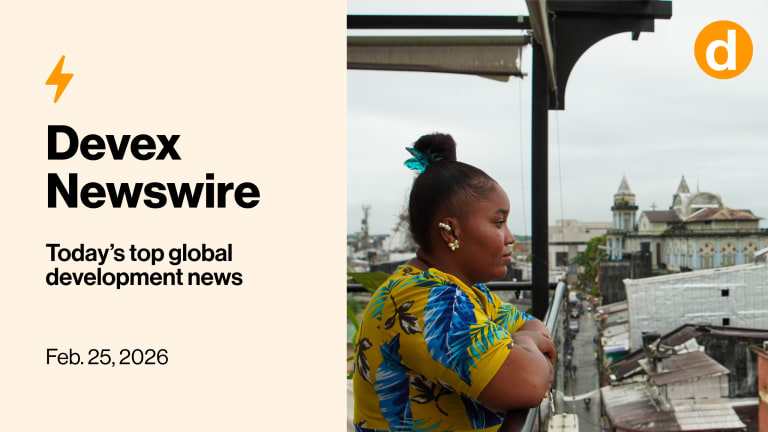Devex Newswire: Cash aid is efficient and simple — so why is it shrinking?

Cash aid lets people choose what they need — and, supporters say, works better than most traditional aid. But global funding is dropping fast, led by a U.S. pullback.
Also in today’s edition: Artificial intelligence has its place in both hiring and TB detection, and what funding cuts to NOAA mean.
+ Tomorrow at 10:30 a.m. ET (4:30 p.m. CET), we’ll be in conversation with Ahmed Saeed, an influential philanthropy and climate funder and a former adviser to two U.S. Treasury secretaries. He will provide critical insights for investors, development professionals, and policymakers navigating climate finance’s next chapter ahead of this month’s Financing for Development conference. Register now to join us.
Cashing out
This is a preview of Newswire
Sign up to this newsletter for an inside look at the biggest stories in global development, in your inbox daily.
For years, humanitarians have championed cash aid: Give people money and let them decide what they need themselves. It’s faster, cheaper, and supports local economies. But now, funding for the practice is slipping, writes my colleague Ayenat Mersie.
Once the fastest-growing form of aid, cash assistance peaked during COVID-19. Now the United States, historically the biggest supporter, is pulling back. USAID recently canceled programs that provided cash, citing accountability concerns. Advocates warn this could accelerate a wider rollback.
Cash’s simplicity makes it easy to slash. You can knock a “zero off a budget line” in seconds, one expert notes. But evidence shows it’s around 25% more efficient than in-kind aid — and often more secure. In fact, more in-kind aid such as food has been stolen in recent years than cash.
Still, many donors and agencies resist it. Cash doesn’t fit neatly into sector-based aid systems and threatens old NGO models. “It doesn’t take twenty NGOs to load an ATM card,” former U.N. official and director of emergencies for Care International James Shepherd-Barron wrote in a 2023 paper, quoting an unnamed U.K. official.
Even so, some see an opportunity. With aid budgets under pressure, cash could be the best way to do more with less. Critics of bloated aid chains — such as U.S. Secretary of State Marco Rubio — have called for fewer intermediaries and more direct support.
“This is the moment,” says Tom Fletcher, the U.N. undersecretary-general for humanitarian affairs and emergency relief coordinator, advising advocates of cash to be ambitious even when it seems the tide is turning against them.
Read: Amid aid cuts, the future of cash programming hangs in the balance
+ With a Devex Pro membership, you’ll be able to unlock our deep-dive reporting into how a shift to cash is changing the aid sector and why it is taking so long to be widely adopted.
If you’ve not yet gone Pro, we have a 15-day free trial for you to explore the benefits including deeper funding insights and insider reporting, members-only briefings with sector leaders and policymakers, priority access to in-person development events and summit roundtables — and you’ll help keep essential journalism open for others.
Joining the nuclear family
The World Bank is lifting its ban on investing in nuclear power, clearing the way for its first foray into nuclear energy in 66 years. That’s according to a document seen by my colleague Jesse Chase-Lubitz — one that also reveals an internal disagreement over the bank’s position on fossil fuels. A source with knowledge of the discussion also tells Devex that Tuesday’s board meeting saw a quarrel over the idea of loosening rules on investing in fossil fuels.
The path to nuclear has been smoothed by Germany’s new government, which reversed the country’s hard-line anti-nuclear stance and said it would no longer stand in the way.
Read: World Bank backs nuclear revival while gas stays a political fault line
Further reading: Is this the moment for nuclear energy at the World Bank?
HR stands for ‘hiring robots’
AI is speeding up recruitment in global development, writing job ads, scanning CVs, even running interviews. But experts say it’s no substitute for human judgment — and sometimes makes things worse.
While AI offers real benefits in emergencies, especially in low-resource areas, it can also make it harder to assess candidates equally, a World Health Organization official tells Devex. AI is great at handling admin tasks fast, says workplace ethics expert Bo Young Lee, but only if organizations closely monitor outcomes to avoid unintended bias.
That’s a big issue, says Oxford Brookes University’s Selin Nugent, because many hiring tools are built in the global north and may overlook or misread local skills, credentials, or offline applications — putting candidates from global south countries at a disadvantage.
And when it comes to assessing qualities like leadership, cultural fit, or empathy, AI falls short. Those are human judgments, not algorithmic ones, multiple recruiters tell Devex contributor Rebecca Root.
Attempts to automate too much — especially using video analysis — can also introduce bias around gender, race, and emotion, Nugent warns.
Candidates trying to “beat” the system with AI-generated cover letters also risk disqualifying themselves, says recruiter Jeremy Schifeling, who warns it could come off as lazy and unoriginal.
Experts say the solution isn’t ditching AI, but using it wisely — with including people in the loop, clear policies, and a focus on ethics and local context. As recruiter Dela Atubra puts it, success lies in blending AI’s speed with human insight to find people who’ll truly make a difference.
Read: AI in development recruitment — time-saver or barrier to inclusion? (Career)
+ A Devex Career Account membership lets you unlock the article and enjoy other benefits including regular special reports analyzing development career trends, access to the full Devex job board, a highlighted profile on the Devex database, exclusive events for insights and advice from top recruiters and sector leaders, and more. Start your 15-day free trial now.
Lung story short
Artificial intelligence can be a godsend in the right situations — such as in India, where it’s helping catch tuberculosis and other deadly lung diseases.
“After a thorough checkup, my father was diagnosed with TB the same day ... The treatment started immediately,” one man tells Devex contributor Cheena Kapoor. The hospital uses Qure.ai’s AI-powered X-rays, which skip sputum tests and deliver near-instant results.
India carries 26% of the global TB burden. In the past year alone, this tribal hospital has diagnosed 88 TB cases using AI, which also helps flag pneumonia, COVID-19, and lung cancer.
“A regular medical officer may not be able to pick/identify all the cases. This is where AI comes into the picture,” says Dr. Anand Bang of SEARCH, the nonprofit that runs the hospital. He says it saves time, reduces errors, and fills staffing gaps.
Qure.ai’s system is already in use across over 100 countries, with strict human oversight to avoid AI hallucinations. “AI does not replace human doctors; it serves as an assistive tool,” says Qure.ai’s Dr. Shibu Vijayan.
Read: How AI is transforming medical diagnosis in India’s tribal regions
+ For more insider reporting on global health, sign up for Devex CheckUp, a free, Thursday newsletter — and get today’s edition in your inbox soon!
Jeff d’oeuvre
The Bezos Earth Fund announced the 24 early-stage projects using AI to fight climate change and biodiversity loss to which it’s awarding $50,000 each. Winners include an audio recording system to keep track of wildlife and detect poachers and an open-source platform turning to machine learning to design plant-based protein sources.
Winners will now enter a two-month “innovation sprint” with expert mentors to refine and stress-test their concepts. Later this year, up to 15 teams will receive $2 million each to scale their solutions over two years, writes Ayenat.
Read: Bezos Earth Fund selects finalists of AI for climate 'grand challenge'
NOAA way to behave
Funding cuts to the National Oceanic and Atmospheric Administration — the U.S. agency behind much of the world’s climate and weather data — are already being felt. With hundreds of staff let go and a proposed 23% budget cut looming, the quality of forecasts is slipping, and global climate tracking is taking a hit.
Experts warn this hurts not just the U.S.’ ability to predict its own natural disasters, but low- and middle-income countries that depend on NOAA’s data to anticipate extreme weather and manage resources such as fisheries.
The European Centre for Medium-Range Weather Forecasts confirmed a 10% drop in NOAA’s weather-balloon data. That kind of loss makes it harder to detect patterns and undermines global reports, especially as the climate crisis escalates, writes Disha Shetty for Devex.
Former NOAA scientist Tom Di Liberto describes devastating cuts — not just to research, but to international collaboration. Other countries might try to fill the gap, but building that capacity quickly is unlikely.
Meanwhile, trust in U.S. climate leadership is fading. Jesse Young, formerly with the U.S. climate envoy’s office, says these moves are pushing other countries to form new alliances without waiting for the U.S.
Read: NOAA cuts hamstring predictions of global south extreme weather
In other news
At least five aid workers with the U.S.- and Israel-backed Gaza Humanitarian Foundation were killed en route to a distribution site on Wednesday. [France 24]
The U.S. has warned of diplomatic repercussions for countries that take “anti-Israel actions” at the upcoming U.N. summit on a potential two-state solution for Israel and the Palestinian territories co-hosted by France and Saudi Arabia. [Reuters]
Fertility rates have dropped in more than half of surveyed countries, with 39% of respondents citing financial constraints as reason for not having children, according to a U.N. report. [Al Jazeera]
Sign up to Newswire for an inside look at the biggest stories in global development.
Search for articles
Most Read
- 1
- 2
- 3
- 4
- 5








